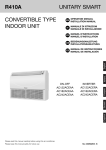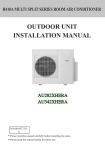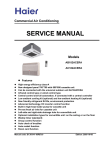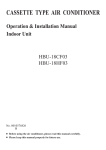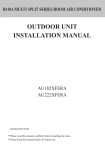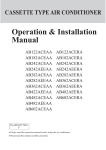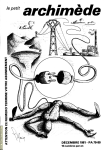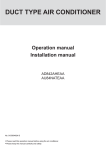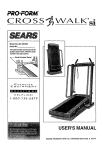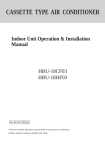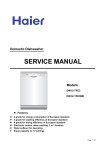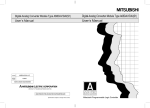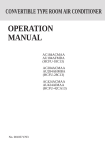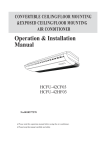Download Operation & Installation Manual
Transcript
CONVERTIBLE TYPE AIR CONDITIONER Operation & Installation Manual AC142ACERA AC182ACERA AC242ACERA No. 0010576952 A Please read this operation manual before using the air conditioner. Please keep this manual carefully and safely. Contents Cautions ............................................................................... 1-2 Safety Precautions .................................................................. 3 Name of Parts.......................................................................... 4 Cleaning and Care .................................................................... 5 Operation Tips .......................................................................... 6 Installation................................................................................ 7 Installation Procedures ...................................................... 8-19 Trouble Shooting ...................................................... 20-22 Cautions Disposal of the old air conditioner Consult your local authorities for the name and address of the waste materials collecting centers and waste paper disposal services nearest to your house. Before disposing an old air conditioner that goes out of use, please make sure it's inoperative and safe. Unplug the air conditioner in order to avoid the risk of child entrapment. It must be noticed that air conditioner system contains refrigerants, which require specialized waste disposal. The valuable materials contained in a air conditioner can be recycled. Contact your local waste disposal center for proper disposal of an old air conditioner and contact your local authority or your dealer if you have any question. Please ensure that the pipework of your air conditioner does not get damaged prior to being picked up by the relevant waste disposal center, and contribute to environmental awareness by insisting on an appropriate, anti-pollution method of disposal. Disposal of the packaging of your new air conditioner All the packaging materials employed in the package of your new air conditioner may be disposed without any danger to the environment. Safety Instructions and Warnings Before starting the air conditioner, read the information given in the User's Guide carefully. The User's Guide contains very important observations relating to the assembly, operation and maintenance of the air conditioner. The manufacturer does not accept responsibility for any damages that may arise due to non-observation of the following instruction. Damaged air conditioners are not to be put into operation. In case of doubt, consult your supplier. Use of the air conditioner is to be carried out in strict compliance with the relative instructions set forth in the User's Guide. Installation shall be done by professional people, don't install unit by yourself. For the purpose of safety, the air conditioner must be properly grounded in accordance with specifications. The cardboard box may be broken or cut into smaller pieces and given to a waste paper disposal service. The wrapping bag made of polyethylene and the polyethylene foam pads contain no fluorochloric hydrocarbon. Always remember to unplug the air conditioner before opening inlet grill. Always grip plug firmly and pull straight out from the outlet. All these valuable materials may be taken to a waste collecting center and used again after adequate recycling. 1 Cautions All electrical repairs must be carried out by qualified electricians. Inadequate repairs may result in a major source of danger for the user of the air conditoiner. Do not damage any parts of the air conditioner that carry refrigerant by piercing or perforating the air conditioner's tubes with sharp or pointed items, crushing or twisting any tubes, or scraping the coatings off the surfaces. If the refrigerant spurts out and gets into eyes, it may result in serious eye injuries. Do not obstruct or cover the ventilation grille of the air conditioner. Do not put fingers or any other things into the inlet/outlet and swing louver. Do not allow children to play with the air conditioner. In no case should children be allowed to sit on the outdoor unit. Specifications The refrigerating circuit is leak-proof. For this model, the all-pole discon-rexion connection method should be applied in the power supply. Such means for disconnection must be incorporation in the fixed wiring. Temperature and Humidity Range Rated Maximum Minimum 32 18 DB C 27 Indoor 23 14 WB C 19 Cooling DB C 35 43 -5 outdoor WB C 24 26 -27 15 Indoor DB C 20 Heating --WB C 14.5 7 24 -15 DB C outdoor 18 -WB C 6 If the air conditioner is used under higher temperature condition than those listed, the built-in protection circuit may operate to prevent internal circuit damage. Also, during Cooling and Dry modes, if the unit is used under conditions of lower temperature than those listed above, the heat-exchanger may freeze, leading to water leakage and other damage. Do not use this unit for any other purposes except for the Cooling and the Heating, Dehumidifying, and air-circulation of rooms should be in ordinary dwellings. The wiring method should be in line with the local wiring standand. The waste battery should be disposed properly. If the fuse on PC board is broken, please change it with the type T 3.15A/250VAC. The air breaker should be all-pole switch. and the distance between it's two contacts should no less than 3mm. Safety Precautions WARNING! If the power supply cord of this air conditioner is damaged, it must be replaced by the manufacturer or its authorized service personnel only. Use copper wire only. All the cables shall have got the Local authentication certificate. the power supply connects from the outdoor side. The power cable and connecting cable are self-provided. The parameter of connecting cable:H05RN-F 4G 0.75mm2. The requirement of the corss section area of the power supply cord: H05RN-F 3G 2.5mm2. If the fuse on PC board is broken please change it with the type of T3.15A/250VAC. DANGER! Do not attempt to install this air conditioner by yourself. This unit contains no user-serviceable parts. Always consult authorized service personnel for repairs. When moving, consult authorized service personnel for disconnection and installation of the unit. Do not become excessively chilled by staying for lengthy periods in the direct cooling airflow. Do not insert fingers or objects into the outlet port or intake grills. Do not start and stop air conditioner operation by connecting and disconnecting the power supply cord and so on. Take care not to damage the power supply cord. In the event of a malfunction (burning smell, etc.), stop operation immediately, turn off the circuit breaker, and consult authorized service personnel. CAUTION! Provide occasional ventilation during use. Do not direct air flow at fireplaces or heating apparatuses. Do not climb on place objects on the air conditioner. Do not hang objects from the indoor unit. Do not set flower vases or water containers on top of the air conditioner. Do not expose the air conditioner directly to water. Do not operate the air conditioner with wet hands. Do not pull power supply cord. Turn off power source when not using the unit for extended periods. Check the condition of the installation stand for damage. Do not place animals or plants in the direct path of the air flow. Do not drink the water drained from the air conditioner. Do not use in applications involving the storage of foods, plants or animals, precision equipment, or art works. Do not apply any heavy pressure to radiator fins. Operate only with air filters installed. Do not block or cover the intake grill and outlet port. Ensure that any electronic equipment is at least one metre away from either the indoor or outdoor unit. Avoid installing the air conditioner near a fireplace or other heating apparatuses. When installing the indoor and outdoor unit, take precautions to prevent access to infants. Do not use inflammable gases near the air conditioner. Name of Parts 10 1 11 TIMER 4 5 6 COMP 7 EMER 2 POWER OPER 3 9 8 Fig.1 Fig.2 3 Fig.1 Indoor Unit 1 2 3 4 5 6 7 8 9 10 11 Operating Control Panel (Fig.2) Emergency switch Remote Control Signal Receiver Power Indicator Lamp (Red) OPERATION Indicator Lamp (Green) TIMER Indicator Lamp (Yellow) Compressor Run Lamp (Green) Intake Grill Air Filter UP/DOWN Air Direction Flaps RIGHT/LEFT Air Direction Louvers (behind UP/DOWN Air Direction Flaps) Fig.3 12 Fig.3 Outdoor Unit 12 Intake grill 13 Outlet grill 14 Pipe Unit 13 14 Note : For the wired control type unit, the unit state should be checked by the the wired controller, instead of the remote receiver; and if you set the TIMER function, the TIMER LED on the remote receiver will not be on. 4 Cleaning and Care CAUTION! Before cleaning the air conditioner ,be sure to turn it off and disconnect the Power Supply Cord. Be sure the Intake Grill is installed securely. When removing and replacing the air filters, be sure not to touch the heat exchanger, as personal injury may result. 4. Re-attach the Air Filters to the Intake Grill. The Filters fit onto the inside of the intake Grill. (figure 1) 2 The bottom edges of the Air Filters should fit into the filter brackets. (figure 1) 3 The Air Filters should be pushed down so that their top edges fit under the projections at the top of the Intake Grill. (figure 2) 1 Cleaning the Air Filter Open the Intake Grill 1. Pull out both sides and the center of the Intake Grill. Air Filter Side Panel About 30 mm (Figure 1) Hook (Figure 2) Notch Filter bracket Arm Arm Intake Grill 2. Pull the Air Filters upward to remove them. Push the Air Filter handles away from the Intake Grille in direction as illustrated, then pull out Air Filters. 5. Push in both sides and the center of the Intake Grill. Air Filter Bracket Base Handle 3. Clean the Air Filters. Remove the dust from the Air Filters by vacuum cleaner or washing them. After washing, allow the Air Filters to dry thoroughly in an area protected from sunlight. 5 Dust can be cleaned from the Air Filter either with a vacuum cleaner, or by washing the filter in a solution of mild detergent and warm water. If you wash the filter, be sure to allow it to dry thoroughly in a shady place before reinstalling. If dirt is allowed to accumulate on the Air Filter, air flow will be reduced, lowering operating efficiency and increasing noise. During periods of normal use, the Air Filters should be cleaned every two weeks. Operation Tips Operation and Performance *Heating Performance STANDARD PARTS This air conditioner operates on the heat-pump principle, absorbing heat from outdoor air and transferring that heat indoors. As a result, the operating performance is reduced as outdoor air temperature drops. If you feel that insufficient heating perfomance is being produced, we recommend you use this air conditioner in conjunction with another kind of heating appliance. The following installation parts are furnished. Use them as required. Optional parts Heat-pump air conditioners heat your entire room by recirculating air throughout the room, with the result that some time may be required after first starting the air conditioner until the room is heated. Instructions relating to heating (*) are applicable only to "HEAT & COOL TYPE". *Microcomputer-controlled Automatic Defrosting When using the Heating mode under conditions of low outdoor air temperature high humidity, frost may form on the outdoor unit, resulting in reduced operating performance. In order to prevent this kind of reduced performance, this unit is equipped with a Microcomputer-controlled Automatic Defrosting function. If frost forms, the air conditioner will temporarily stop, and the defrosting circuit will operate briefly (for about 7 to 15 minutes). 6 Mark Parts name A Adhesive tape B C Saddle (L.S) with screws Drain hose D Heat insulation material E Piping hole cover F Putty G Plastic clamp Installation Please ask the dealer or specialist to install, never try by the users themselves. After the installation please be sure of the following conditions. WARNING ! Please call dealer to install the air-conditioner. Incorrect installation may cause water leaking, shock and fire hazard. CAUTION ! Air-conditioner can't be installed in the environment with inflammable gases because the inflammable gases near to air-conditioner may cause fire hazard. Connect earthing wire. Earthing wire should not be connected to the gas pipe, water pipe, lightning rod or phone line, incorrect earthing may cause shock. Installed electrical-leaking circuit breaker. It easily cause electrical shock without circuit breaker. Earthing Use discharge pipe correctly to ensure efficient discharge. Incorrect pipe use may cause water leaking. [Location] Air-conditioner should be located in well-vented and easily-accessible place. Air-conditioner should not be located in the following places: (a) Places with machine oils or other oil vapours. (b) Seaside with high salt content in the air. (c) Near to hot spring with high content of sulfide gases. (d) Area with frequent fluctuation of voltage e.g. factory, etc. (e) In vehicles or ships. (f) Kitchen with heavy oil vapour or humidity. (g) Near to the machine emitting electric-magnetic waves. (h) Places with acid, alkali vapuor. TV, radio, acoustic appliances etc are at least 1 m far away to the indoor unit, outdoor unit, power supply wire, connecting wire, pipes, otherwise images may be disturbed or noises be created. As required, take measures against heavy snow. [Wiring] Air-conditioner should be equipped with special power supply wire. [Operating noise] Choose the following locations: (a) Capable of supporting air-conditioner weight, don't increase operating noise and vibration. (b) Hot vapour from outdoor unit outlet and operating noise don't disturb neighbour. No obstacles around the outdoor unit outlet. 7 Installation Procedures SELECTING THE MOUNTING POSITION Under ceiling WARNING Install at a place that can withstand the weight of the indoor and outdoor units and install positively so that the units will not topple or fall. Right Indoor unit Left 30 cm or more CAUTION 1.5m Ceiling (1)Do not install where there is the danger of combustible gas leakage. (2) Do not install near heat sources. (3) If children under 10 years old may approach the unit, take preventive measures so that they cannot reach the unit. 2 cm or more Decide the mounting position with the customer as follows: 1. INDOOR UNIT (1) Install the indoor unit level on a strong wall, floor, ceiling which is not subject to vibration. (2) The inlet and outlet ports should not be obstructed: the air should be able to blow all over the room. (3) Install the unit near an electric outlet or special branch circuit. (4) Do not install the unit where it will be exposed to direct sunlight. (5) Install the unit where connection to the outdoor unit is easy. (6) Install the unit where the drain pipe can be easily installed. (7) Take servicing, etc. into consideration and leave the spaces shown in Fig.A. Also install the unit where the filter can be removed. 6.35mm 12.7mm Outdoor unit Floor console Fig.A may be difference 1.5m Left Right Indoor unit 30 cm or more 1.5m 30 cm or more 8 Installation Procedures 2. OUTDOOR UNIT Fig.B WARNING (1) Install the unit where it will not be tilted by more than 5 . 30 cm or more (2) When installing the outdoor unit where it may be exposed to the strong wind, fasten it securely. 40 cm or more 30 cm or more (1) If possible, do not install the unit where it will be exposed to direct sunlight.(If necessary, install a blind that does not interfere with the air flow.) (2) Install the outdoor unit in a place where it will be free from being dirty or getting wet by rain as much as possible. (3) Install the unit where connection to the indoor unit is easy. (4) During heating operation, drain water flows from the outdoor unit. Therefore, install the outdoor unit in a place where the drain water flow will not be obstructed. (Reverse cycle model only) (5) Do not place animals and plants in the path of the warm air. (6) Take the weight of the air conditioner into account and select a place where noise and vibration are small. (7) Select a place where the warm air and noise from the air conditioner do not disturb neighbors. (8) Provide the space shown in Fig.B so that the air flow is not blocked. Also for efficient operation, leave open three of the four directions front, rear, and both sides. 60 cm or more 60 cm or more 9 Installation Procedures PREPARING INDOOR UNIT INSTALLATION 1. REMOVE THE INTAKE GRILL Open the intake grill and remove the three or four or six screws.(Fig. 1) Fig. 1 Remark: The main unit can be wired before the indoor unit is installed. Select the most appropriate installation order. Intake grill A. FLOOR CONSOLE TYPE When the directions are selected, drill a 7 cm dia. hole on the wall so that the hole is tilted downward toward the outdoor for smooth water flow. When the pipe is led out from the rear, make a hole in Fig.4, at the position shown. 1. DRILLING FOR PIPING Select piping and drain directions.(Fig.2) The piping and drain can be made in three directions as shown below. (Fig.4) (Fig.2) Wall 6mm 7cm rear Indoor unit right outdoor unit down When installing set to wall, install the accessory wall bracket at the position shown in Fig.5,and mount the set to it. The drain hose can be connected to either the left or right side.(Fig.3) (Fig. 3) (Fig. 5) 99cm 50cm 24.5cm Wall bracket Drain hose (Left side) Drain hose (Right side) 10 7cm hole 3.5cm hole 12.5cm 10cm 6.5cm 53cm 4.5cm 65.5cm Side of set 6.5cm Installation Procedures 2. INSTALLING DRAIN HOSE Wrap the insulation (drain hose) around the drain hose connection. (Fig.7) Select whether the drain hose will be connected to the left or right side.(Fig.3) Insert the drain hose into the drain pan, then secure the drain hose with a nylon fastener. (Fig.6) (Fig. 6) (Fig. 7) Drain pan Drain pan Nylon fastener Insulation (Drain hose) Drain hose Drain hose Be sure to arrange the drain hose correctly so that it is leveled lower than the drain hose connecting port of the indoor unit. OK Fig. 8 NO Arrange the drain hose lower than this portion. NO Drain hose CAUTION Do not install the unit drain hose side is too high. Height A should be less than 5 mm.(Fig.9) Fig. 9 Drain hose A A B. UNDER CEILING TYPE Using the installation template, drill holes for piping and anchor bolts(for holes).(Fig.10) 900mm 200mm Installation template Ceilling Wall Fig. 10 Drilling position for piping 11 Drilling position for anchor bolt Installation Procedures 1. DRILLING FOR PIPING 3. INSTALLING BRACKETS Select piping and drain directions. (Fig.11) Install the brackets with nuts, washers and spring washers.(Fig. 15) Rear (Install the drain hose in the direction.) Fig. 15 Right Spring washer Bracket Special nut Fig. 11 CAUTION Bracket (Left) Bracket (Right) Install the drain hose at the rear; it should not be installed on the top or right side. When the directions are selected, drill 80mm and 50mm or 150mm dia. hole on the wall so that the hole is tilted downward toward the outdoor for smooth water flow. Fig. 12 4. INSTALLING INDOOR UNIT Reset the hex bolts as shown in Fig.16. Wall Fig. 16 6mm Hex bolt 8 to 13mm Indoor unit 2. DRILLING HOLES FOR ANCHOR BOLTS AND INSTALLING THE ANCHOR BOLTS With a concrete drill, drill four 12.7 mm dia. Holes. (Fig.13) Apply the indoor unit to the brackets.(Fig.17) Fig. 13 60 to 70mm Fig. 17 12.7mm Bolt Insert the anchor bolts into the drilled holes, and drive the pins completely into the anchor bolts with a hammer. (Fig. 14) Bracket Indoor unit Now, securely tighten the hex bolts in both sides. Fig. 14 12 Installation Procedures 5. INSTALL THE DRAIN HOSE OUTDOOR UNIT INSTALLATION Select whether the drain hose will be connected to the left or right side.(Fig.3) Insert the drain hose into the drain pan, then secure the drain hose with a nylon fastener.(Fig.6) Wrap the insulation (drain hose)around the drain hose connection.(Fig.7) Be sure to arrange the drain hose correctly so that it is leveled lower than the drain hose connecting port of the indoor unit.(Fig.18) CONNECTING THE PIPING 1. FLARE PROCESSING (1) Cut the connection pipe with pipe cutters so that the pipe is not deformed. (2) Holding the pipe downward so that cuttings cannot enter the pipe, remove the burrs. (3) Remove the flare nut from the indoor unit pipe and outdoor unit and assemble as shown in (Table1) and insert the flare nut onto the pipe, and flare with a flaring tool. Fig. 18 Remove the hole cover. (4) Check if the flared part "L" (Fig.20)is spread uniformly and that there are no cracks. Table 1 Arrange the drain hose lower than this portion Drain hose OK Pipe Flare nut Small pipe Small (width across flats 22mm) Large pipe Large (width across flats 24mm) Fig. 20 Width across flats L dimension L NO Diameter of pipe AC142ACERA AC182ACERA AC242ACERA Fig. 19 Liquid pipe 6.35mm (1/4”) Gas pipe 12.7mm (1/2”) Liquid pipe 9.52mm (3/8”) Gas pipe 15.88mm (5/8”) Dimension A (mm) 1.0~1.2 1.4~2.2 Piping hole 2. BENDING PIPES Base (Bottom) The pipes are shaped by your hands. Be careful not to collapse them. VT wire hole Intake grill Fig. 21 Pass the drain hose through here Cut the grill VT wire OK NO Extend the pipe by unwinding it Drain hose 13 Installation Procedures 1.Selection of hte place of installation Select the place of installation satisfying the following conditions and, at the same time, obtain consent from the client or user. Place where air circulates. Place free from heat radiation from other heat sources. Place where drain water may be discharged. Place where noise and hot air may not disturb the neighbors. Place where there is not heavy snowfall in winter. Place where obstacles do not exist near the inlet air port and outlet air port. Place where the outlet port may not be exposed to a strong wind. Place surrounded at four sides are not suitable for installation. A 1m or more of overhead space is needed for the unit. Mount guide-louvers to place where short-circuit is a possibllity. When installing several units, secure sufficient suction space to avoid short circuiting. 2. Installation of outdoor unit Fix the unit in a proper way according to the condition of a place where it is installed by referring to the following. Fig. 22 (b) Foundation anchor (a) Concrete foundation(Fig. 22) Unit Unit Anchor bolt Concrete foundation Concrete foundation Anchor bolt Note (1)Place the concrete foundation deep enough. Note (1)Give enough room for the concrete foundation to fix anchor bolts. Install the unit so that the angle of inclination must be less than 3 degrees. 3. Refrigerant piping (3) Limitations for one way piping length and vertical height difference. (1) Outline of piping Flare connection 3-way valve Gas pipe (Fig. 23) Precautions for refrigerant piping Outdoor unit Indoor unit Liquid pipe 3-way valve Flare connection Do not twist or crush piping. Be sure that no dust is mixed in piping. Bend piping with as wide angle as possible. Keep insulating both gas and liquid piping. Check flare-connected area for gas leakage. (4) Piping connection (Fig.23) (2) Piping size AC142ACERA AC242ACERA AC182ACERA Liquid pipe 6.35x0.8mm 9.52x0.8mm Gas pipe 12.7x0.8mm 15.88x1.0mm Install the removed flare nuts to the pipes to be connected, then flare the pipes. 90 0.5 One way piping length: Less than 15 mm Vertical height difference: Less than 5 m Connecting method Apply refrigerant oil at half union as large and flare nut. To bend a pipe, give the roundness as possible not to crush the pipe. When connecting pipe, hold the pipe centre to centre then screw nut on by hand, refer to Fig. Be careful not to let foreign matters, such as sands enter the pipe. Fastening Pipe dia Forced fastening without centering may damage the threads and cause a gas leakage. 14 torque N.m Liquid pipe 6.35mm 11.8 Gas pipe 12.7mm 49.0 Liquid pipe 9.52mm 40 Gas pipe 15.88mm 60 Installation Procedures AIR PURGING METHOD (TO USE VACUUM PUMP) For these models , the refrigerant is R410A. Liquid pipe To use vacuum pump (for eg.AC182ACERA). 6.35mm(1/4'') 1 Gas pipe 2-way valve Detach the service port's cap of 3-way valve, the valve rod's cap for 2-way valve and 3-way's, connect the service port into the projection of charge hose (low) for gaugemanifold. Then connect the projection of charge hose (center) for gaugemanifold into vacuum pump. 12.7mm(1/2'') 3-way valve Gaugemanifold (R410A) Vacuum pump(R410A) 2 Open the handle at low in gaugemanifold, operate vacuum pump. If the scale-moves of gause (low) reach vacuum condition in a moment, check 1 again. 2 Open 3 Vacuumize for over 15min. And check the level gauge which should read -0.1 MPa (-76 cm Hg) at low pressure side. After the completion of vacuumizing, close the handle 'Lo' in gaugemanifold and stop the operation of the vacuum pump. Check the condition of the scale and hold it for 1-2min. If the scale-moves back in spite of tightening, make flaring work again, the return to the beginning of 3 . 3 Close 2-way valve 4 3-way valve 90 Open the valve rod for the 2-way valve to and angle of anticlockwise 90 degree. After 6 seconds later, close the 2-way valve and male the inspection of gas leakage. 5 No gas leakage? In case of gas leakage, tighten parts of pipe connection. If leakage stops, then proceed 6 steps. 6 90 Service port 4 90 for 6 sec. If it does not stop gas leakage, discharge whole refrigerants from the serice port. After flaring work again and vacuumize, fill up prescribed refrigerant from the gas cylinder. Detach the charge hose from the service port, open 2-way valve and 3-way. Turn the valve rod anticlockwise until hitting lightly. 2-way valve 6 3-way valve 7 To prevent the gas leakage, turn the service port's cap, the valve rod'd cap for 2-way valve and 3-way's a lottle more than the point where the torque increases suddenly. 6 8 After attaching the each caps, check the gas leakage around the caps. 2-way valve 3-way valve CAUTION: If the refrigerant of the air conditioner leaks, it is necessary to make all the refrigerant out, then charge the liquid refrigerant into air conditioner according to the amount marked on the name plate. 7 Valve rod cap 7 Valve rod cap 7 Service port cap CAUTION After connecting the piping, check the joints for gas leakage with gas leakage detector. 15 Installation Procedures HOW TO CONNECT WIRING TO THE TERMINALS A. For solid core wiring (or F-cable)(Fig.24A) (1) Cut the wire with a wire cutter or wire-cutting pliers, then strip the insulation to about 25mm of the exposed solid wire. (2) Using a screwdriver, remove the terminal screw(s) on the terminal board. (3) Using pliers, bend the solid wire to form a loop suitable for the terminal screw. (4) Shape the loop wire properly, place it on the terminal board and tighten securely with the terminal screw using a screw driver. B. For strand wiring(Fig.24B) (1) Cut the wire with a wire cutter or wire-cutting pliers, then strip the insulation to about 10mm of the exposed strand wiring. (2) Using a screwdriver, remove the terminal screw(s)on the terminal board. (3) Using a round terminal fastener or pliers, securely clamp a round terminal to each stripped wire end. (4) Position the round terminal wire, and replace and tighten the terminal screw using a screw driver. Fig. 24 Strip 25mm A. Solid wire B. Strand wire Strip 10mm Loop Insulation Screw with special washer Wire Round terminal Screw with special washer Round terminal Terminal board Round terminal Wire HOW TO FIXED CONNECTION CORD AND POWER CABLE AT THE CORD CLAMP After passing the connection cord and power cable through the insulation tube, fasten it with the cord clamp, as shown in Fig.25 Fig. 25 Insulation tube Cord clamp Use VW-1, 0.5 to 1.0 mm thick, PVC tube as the insulation tube. 16 Installation Procedures ELECTRICAL REQUIREMENT (2) Pull out the electric component box. Electric wire size and fuse capacity: Fig.28 Table 5 Type AC142ACERA AC182ACERA AC242ACERA Connection cord (mm2) 0.75 0.75 0.75 Power supply 2.5 2.5 4.0 30 30 4.0 cord (mm2) Fuse capacity(A) Electric component box (3) Remove the electric component box cover. Fig. 29 ELECTRICAL WIRING CAUTION (1) Match the terminal block numbers and connection cord colors with those of the outdoor unit. Erroneous wiring may cause burning of the electric parts. Base Electric component box cover (2) Connect the connection cords firmly to the terminal block. Imperfect installation may cause a fire. Remove the three tapping screws. (3) Always fasten the outside covering of the connection cord with the cord clamp.(If the insulator is chafed, electric leakage may occur.) CAUTION Be careful not to pinch the lead wires between the electric component box and base. (4) Always connect the ground wire. 1. INDOOR UNIT SIDE (4) Wiring (1) Remove the electric component box. (1) Remove the cord clamp. (2) Process the end of the connection cords to the dimensions shown in Fig.34. (3) Connect the end of the connection cord fully into the terminal block. (4) Fasten the connection cord with a cord clamp. (5) Fasten the end of the connection cord with the screw. Fig. 26 Electric component box Fig. 27 1 2 3 N L INDOOR UNIT TERMINAL BLOCK Electric component box OUTDOOR UNIT TERMINAL BLOCK L N 1 2 3 Power supply: 1PH, 220-230V~, 50Hz 060309***** Remove the four tapping screws. CAUTION Do not remove the screws. If the screws are removed, the electric component box will fall. 17 Installation Procedures ELECTRICAL WIRING (2) Air filter removal and cleaning, and how to use air louvers. (3) Give the operating and installation manuals to the customer. WARNING (1) Always use a special branch circuit and install a special receptacle to supply power to the room air conditioner. MOUNT THE COVER PLATE AND THE INTAKE GRILL (2) Use a circuit breaker and receptacle matched to the capacity of the room air conditioner. (3) The circuit breaker is installed in the permanent wiring. Always use a circuit that can trip all the poles of the wiring and has an isolation distance of at least 3mm between the contacts of each pole. 1.Mount the cover plate. (Right) (1) Cut a pipe exit hole in the right plate. This is only when the pipe exits from the right side. (This operation is not required when the protrusion is on the top or rear.) (4) Perform wiring work in accordance with standards so that the room air conditioner can be operated safely and positively. (5) Install a leakage circuit breaker in accordance with the related laws and regulations and electric company standards. Fig. 31 Cover plate (Right) CAUTION (1) The power source capacity must be the sum of the room air conditioner current and the current of other electrical appliances. When the current contracted capacity is insufficient, change the contracted capacity. (2) Join the cover plates (right) and mount with screws. Fig. 32 (2) When the voltage is too low and the air conditioner is difficult to start, contact the power company the voltage raised. TEST RUNNING 1. CHECK ITEMS (1) INDOOR UNIT (1) Is operation of each button on the remote control unit normal? (2) Does each lamp light normally? (3) Do not air flow direction louvers operate normally? (4) Is the drain normal? 2. Mount the cover plate.(Left) (1) Join the cover plate (left) and mount with screws. Fig. 33 (2) OUTDOOR UNIT (1) Is there any abnormal noise and vibration during operation? (2) Will noise, wind, or drain water from the unit disturb the neighbors? (3) Is there any gas leakage? CUSTOMER GUIDANCE Explain the following to the customer in accordance with the operating manual: (1) Starting and stopping method, operation switching, temperature adjustment, timer, air flow switching, and other remote control unit operations. 18 Installation Procedures 3. Mount the intake grill. (1) Cut the right side of the intake grill. This is only when the pipe exits from the right side Fig. 34 (2) Insert the hinges on the bottom of the intake grill into the holes in the base assembly. Then mount the arms to the three areas on the top of the intake grill. Fig. 35 19 Trouble Shooting Followings are not problems Sound of water flowing is not a problem. During unit operation or at stop, a swishing or gurgling noise may be heard. This noise is generated by refrigerant flowing in the system. Sound of cracking is heard. During unit operation, a cracking noise may be heard. This noise is generated by the casing expanding or shrinking because of temperature changes. Smell are generated. This is because the system circulates smells from the interior air such as the smell of cigarettes or the painting on the furniture. During operation, white fog or steam comes out from the indoor unit. When unit is running at places like restaurant, etc. where dense edible oil fumes always exist, this will happen. In cooling operation, unit switches to blowing operation. To prevent frost from accumulating on indoor heat exchanger, unit will switch to blowing operation for a while then resume cooling operation. Unit will not restart after stop. Though ON/OFF button is set to ON, unit won't resume cooling, dry or heating operation in 3 min after it is stopped, this is because of 3-min-delay protection circuit. Please wait 3 minutes Won't start? No outlet air or fan speed can't be changed in dry mode. Unit will reduce fan speed repeatedly and automatically if room temp. is too low in dry operation. In heating operation, water or steam are blown out of outdoor unit. This occurs when frost accumulated on the outdoor unit is removed. (during defrosting operation) In heating operation, indoor fan won't stop even if unit is stopped. After unit stop, indoor fan will go on running until indoor unit cools down. 20 Trouble Shooting Before ask for services, please first check your unit against the following. Air conditioner won't start. Is power supply switch turned on? Power supply switch is not set at ON. Is city power supply normal? Power failure? Is leakage current breaker activated? This is very dangerous, please disconnect power supply immediately and contact your dealer. Poor cooling or heating Are operation control adjusted correctly as specified? Is air filter too dirty? Are there any obstacles in inlet or outlet grill? Proper temp Are horizontal louvers at up position (in heating mode)? Any doors or windows left open? Poor cooling Is there any direct sunlight in the room? Cold air blows out (in heating mode) Is air conditioner in standby condition in heating mode? If there are unexpected heat sources in the room? Too many people in the room? If your unit still can't work properly after above mentioned checks, or following problems occur, please stop it immediately and contact your dealer. Fuses or circuit breakers often blow out. Water comes out in cooling/dry operation. Operation is abnormal or sound is heard. 21 22 Communication abnormal for more than 4m continuously Communication abnormal for more than 4m continuously Float switch broken down for more than 25m continuously Outside signal broken down for more than 10s Sensor broken down or short circuit for more than 2m continuously Solenoid valve act incorrectly 3 times continuously Sensor broken down or short circuit for more than 2m continuously EEPROM data missing Low pressure switch acts in normal running CT check abnormal 3 times in 30m High pressure switch acts 3 times in 30m Fault phase, short of phase, out of balance greatly Sensor broken down or short circuit for more than 2m continuously Sensor broken down or short circuit for more than 2m continuously Sensor broken down or short circuit for more than 2m continuously Sensor broken down or short circuit for more than 2m continuously Reason 17 Compressor overheat The discharging temperature is higher than 120degree 18 Abnormal mode Indoor operation mode is different with the running indoor unit. 19 Outdoor coil B(suction temp sensor-for MRV II) Sensor broken down or short circuit for more than 2m continuously 20 Outdoor discharging B(oil temp sensor-for MRV II) Sensor broken down or short circuit for more than 2m continuously shows resumable fault, * shows it is not resumable fault. For remote Failure description type, flash times 1 Indoor ambient temp. sensor failure 2 Indoor coil temp. sensor failure 3 Outdoor ambient temp. sensor failure 4 Outdoor coil temp. sensor failure (compressor discharging temp. sensor) 5 Over-current protection 6 High pressure abnormal 7 Power supply abnormal Communication between wired 8 controller and indoor abnormal 9 Communication between indoor and outdoor abnormal 10 Drainage system abnormal 11 Outside alarm signal input 12 Gas pipe temp. sensor abnormal 13 Solenoid valve abnormal 14 Discharging temp. sensor abnormal 15 EEPROM abnormal 16 Pressure abnormal(low pressure) Resumable if lower than 100 degree Remarks Trouble Shooting HAIER GROUP Qingdao Haier Air Conditioner Electric Co., Ltd. Address: Haier Garden, Qianwangang Road, Economic Development Zone, Qingdao, Shandong 266500, P.R.China Web Site: http://www.haier.com



























